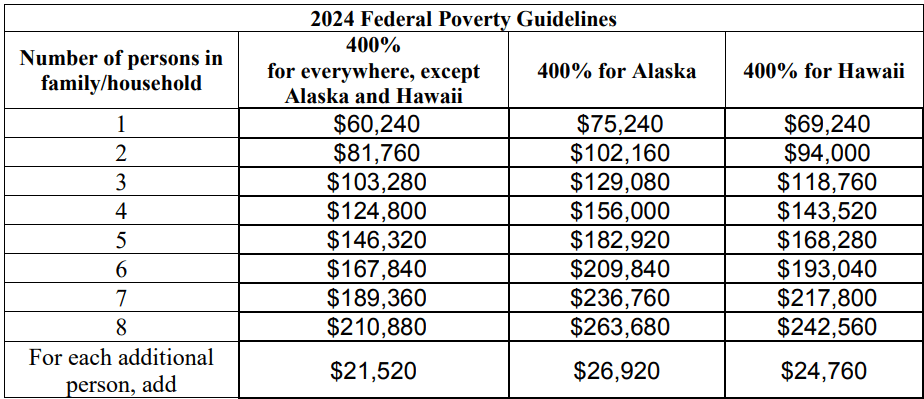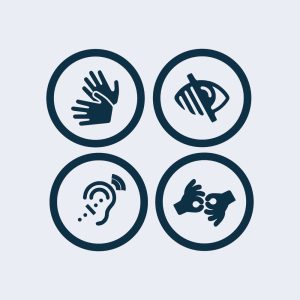FCC National Deaf Blind Equipment Distribution Program
The FCC’s National Deaf-Blind Equipment Distribution Program (NDBEDP), also known as iCanConnect, provides equipment needed to make telecommunications, advanced communications, and the Internet accessible to low-income individuals who are deaf-blind or have both significant vision loss and significant hearing loss. The program serves eligible residents of all 50 states, the District of Columbia, American Samoa, Guam, the Northern Mariana Islands, Puerto Rico, and the U.S. Virgin Islands. In addition to equipment, assessments of specific accessibility needs, equipment installation, training, and other technical support are also available.
Who is eligible?
Low-income individuals who are deaf-blind are eligible to receive equipment. Applicants must provide verification of their status as low-income and deaf-blind.
Deaf-blind eligibility requirements – an individual must have a combination of vision loss and hearing loss, as described next, that cause extreme difficulty in attaining independence in daily life activities, achieving psychosocial adjustment, or obtaining a vocation.
Individuals must have the following combination to be considered eligible:
Significant vision loss is defined as having at least one of the following conditions:
▪ Visual acuity of 20/200 or less in the better eye with corrective lenses,
▪ A field defect such that the peripheral diameter of the visual field is no greater than 20 degrees, or
▪ Progressive visual loss with a prognosis leading to one or both of above conditions.
Significant hearing loss is defined as having at least one of the following conditions:
▪ Chronic hearing disabilities so severe that most speech cannot be understood with optimum amplification, or
▪ Progressive hearing loss having a prognosis leading to above condition.
A professional must attest to the hearing and vision loss in writing. Examples of professionals include a community service provider, educator, healthcare provider, vision or hearing professional, vocational rehabilitation counselor, or a medical or health professional.
Income eligibility requirements – not more than 400% of the Federal Poverty Guidelines – are outlined in the following chart:

Source: U.S. Department of Health and Human Services (https://aspe.hhs.gov/poverty-guidelines)
Type of equipment available
Type of equipment available
The equipment distributed through the program is designed to make the following services accessible:
▪ Voice communication through wireline and wireless telephones
▪ Internet-based voice communication
▪ E-mail, text messaging, and instant messaging
▪ Interoperable video conferencing services
▪ Internet access, including information services
The equipment may be mainstream or specialized hardware, software or applications and must meet the needs of the deaf-blind individual to achieve access. Equipment warranties, maintenance and repairs may also be provided.
Find the program in your state?
Find the program in your state
To find the NDBEDP certified program in your state, go to icanconnect.org/how-toapply/#contactmystate or call 1-800-825-4595.
You can also send an email to dro@fcc.gov or call the FCC:
▪ Voice: 1-888-CALL-FCC (1-888-225-5322)
▪ Videophone: 1-844-432-2275
Filing a Complaint
You may contact the FCC’s Disability Rights Office or file a complaint when you believe an NDBEDP certified program has not followed the FCC’s rules.
A complaint must include the following: your name and contact information; the name of the NDBEDP certified program; a description of the problem or issue; how you want the problem or issue resolved; and your preferred format or method of response, such as by letter, telephone, or email.
You may send your complaint to the Disability Rights Office by any reasonable means, such as by letter, fax, telephone, TTY, or email. You may also contact the Disability Rights Office if you need assistance filing a complaint.
Disability Rights Office
Consumer and Governmental Affairs Bureau
Federal Communications Commission
45 L Street NE
Washington, DC 20554
Email: dro@fcc.gov
Phone: 202-418-2517
Videophone: 844-432-2275
The Disability Rights Office will forward your complaint to the NDBEDP certified program for a response. The Disability Rights Office will review the response and may communicate with you and the NDBEDP certified program. The Disability Rights Office will inform you and the NDBEDP certified program of its disposition of your complaint.
If you are not satisfied with the Disability Rights Office’s disposition of your complaint, you may file a formal complaint with the FCC in accordance with the FCC’s formal complaint filing procedures.
Alternate formats
To request this article in an alternate format – braille, large print, Word or text document or audio – write or call us at the address or phone number at the bottom of the page, or send an email to fcc504@fcc.gov.
Last Reviewed 1/24/24

